Federal and regional elections in Belgium, 9 June 2024
Issue
Issue #5Auteurs
Romain Biesemans , Daan Delespaul , David Talukder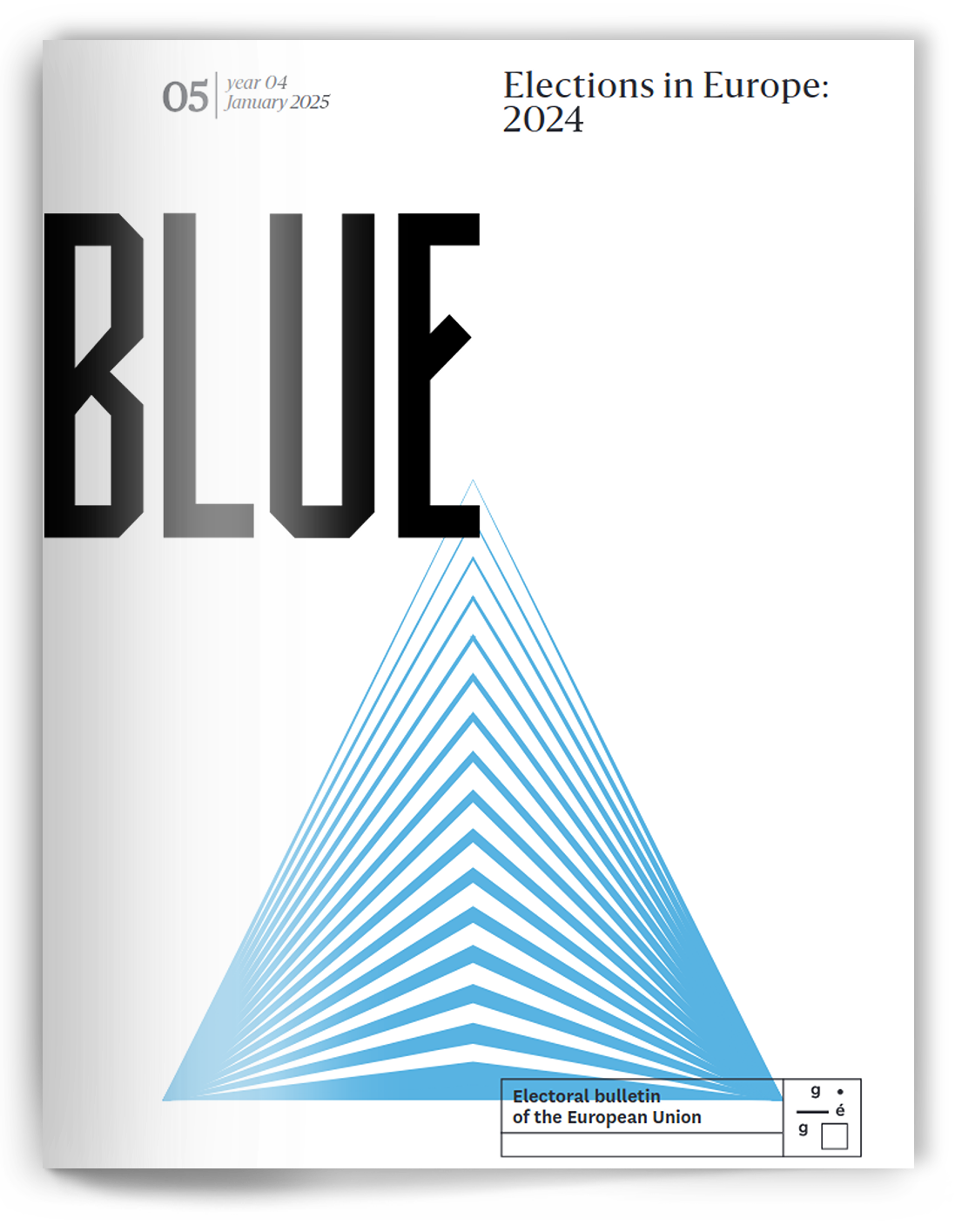
Issue 5, January 2025
Elections in Europe: 2024
Introduction
Political analysts could indulge themselves on the 9th of June 2024, since Belgium hosted no less than six separate elections. The results of these elections were meant to change the power balance on the national, regional, communitarian and European government levels. In the current note, we will discuss the results in the three main regions – Flanders, Wallonia and Brussels – and the federal level. While the results followed expected patterns in the largest region of Flanders, more significant political changes occurred in Wallonia and Brussels.
The 2024 regional elections in Flanders
The Flemish elections were anticipated to be a litmus test for the long-standing cordon sanitaire against the far-right Flemish Interest (VB, PfE). The party’s stellar rise in the polls dominated a campaign that mainly centered on the question of whether it would be able to enter government. The anticipated victory of the far right was built on quicksand, however, and the center-right New Flemish Alliance (N-VA, ECR) managed a remarkable and unexpected victory in Flanders. Besides this two-sided duel, the main talking points turned out to be the decline of the governing liberal and green parties.
Results of the election
In the end, the cordon sanitaire never came under threat. Despite that VB forced an electoral breakthrough in many of the rural communities in West-Flanders and Limburg, the N-VA held its ground in the suburbanized areas around Antwerp and Flemish Brabant. The N-VA managed to hold on to 23.88% of the Flemish vote share, while VB achieved an overall disappointing result of 22.66%.
In the previous elections (in 2019), roughly 12% of all volatility in Flanders was between VB and the N-VA. Overall, both parties have been communicating vessels since the N-VA’s rapid upsurge in 2010 (Swyngedouw et al., 2024). In the last weeks prior to the election date, N-VA leader Bart De Wever thus built up an effective strategy aimed at ostracizing the far-right: first, by clearly excluding the possibility of coalition talks with VB (referring to “a Chinese wall” between the two parties), and second, by highlighting radical viewpoints in the VB program. The N-VA also managed to restructure the political agenda to some of its core issues, such as government expenditure and state reform. Meanwhile, the VB campaign centered on gender and “woke” issues, that were ultimately perceived to be too radical for the majority of Flemish voters. All this suggests that VB lost a significant amount of more moderate supporters to the N-VA in the final weeks of the campaign (Walgrave et al., 2024).
Onward (Vooruit, S&D), the Flemish social-democrats, pulled off an historical result by staunching a 20-year long decline in electoral support. For the first time in its history, the party is now the largest of the three traditional parties in Flanders. The Vooruit-campaign was spearheaded by the popularity of its former party leader Conner Rousseau, who, despite stepping down due to racist remarks about the Roma community, garnered the most preference votes in his constituency of East-Flanders. After rebranding the party in 2021, Rousseau adopted a more centrist course on the economic and cultural dimensions, for example by advocating for more demanding active labour market policies and mandatory integration programs for newcomers. The party currently sits on 13 seats (13.85%) and is now set to enter all levels of government.
The Christian Democratic and Flemish (cd&v, EPP) continued its steady decline by losing 3 seats (-2.36%). This result was hailed as a victory, given that the party implemented unpopular nitrogen reduction measures that were disliked by the party’s farming electorate. By comparison, the Open Flemish Liberals and Democrats (Open Vld, RE) and Greens (Groen, Greens/EFA) were caught in a deeper state of crisis – which in both cases was incited by their performance in the federal “Vivaldi” government. Despite that the Open Vld included the relatively popular federal prime minister Alexander De Croo in its ranks, it ultimately collapsed due to infighting, a poorly run campaign, and the implementation of certain left-wing policies in the Vivaldi government. After losing 7 seats (-4.81%) the party is now set for opposition at all levels of government. Groen, meanwhile, lost 5 seats (-2.82%) and flirted with the electoral threshold of 5%. The party suffered from a disappointing tenure in the federal government that was mainly marked by a failed nuclear phase out.
Finally, the Flemish faction of the left-wing Workers’ Party (PVDA, GUE/NGL) achieved a remarkable success by gaining 5 seats (+2.99%). The party is a relative newcomer in the Flemish party system and has mainly garnered votes from its left-wing competitors Vooruit and Groen (Swyngedouw et al., 2023). The focal point of its success is based in the city of Antwerp, where the party scored an outlying result of 21.91%. While PVDA already included a loyal and highly active partisan base of middle-class socio-cultural professionals, its success in larger cities indicates a growing support among working-class and ethnic minority voters (Abts et al., 2024). 1
Hollowing out the center
Overall, the results of the 2024 elections on the Flemish side serve as a continuation of long-term developments that have been unfolding over the past few decades. These are mainly characterized by the decline of traditional parties and the related upsurge of challenger parties along the new cultural cleavage (Delespaul et al., 2024). As a result, the three traditional parties of cd&v, Vooruit, and Open Vld have now lost half of their combined vote share compared to the elections of 1991.
The weak result of the liberal Open Vld ensured that the outgoing coalition of N-VA, cd&v and Open Vld required a new junior partner. A solution was quickly found, as Vooruit replaced Open Vld in a centrist cabinet that forms an ideological reissue of the Peeters II-coalition (2009-2014). The Diependaele-cabinet will mainly focus on education, increase government spending on welfare and promises harsher treatment of newcomers with insufficient command of the Dutch language.
The 2024 regional elections in Wallonia
The political landscape in Belgium has evolved in the last decades and several issues were at stake in Wallonia and, more generally, in French-speaking Belgium. On the hand there is increased competition on the left side of the political spectrum with two key parties competing: the traditional Socialist Party (PS, S&D) one of the main political forces, and the Workers’ Party (PTB, GUE/NGL), a far-left party which increased its electoral support at the last two elections at the point of becoming a threat for the PS. In addition, the Ecologists (Ecolo, Greens/EFA)are positioned on the left side of the political spectrum, putting even more pressure on the left.
Conversely, the right side of the political spectrum became less competitive. The far-right People’s Party (PP, NI) lost their only representative in 2019 and cleared out the space for other parties. The liberal Reformist Movement (MR, RE) often positioned at the centre-right of the political spectrum, shifted further to the right and aimed to become the leading Walloon party.
Finally, another important issue at stake was the fate the Christian democrats: ‘The Commited Ones’ (Les Engagés [LE, EPP]). After a severe loss in 2019 the party went through an important process of renewal in terms of personnel, programs, and rebranding from the old cdH (see Legein & Rangoni, 2024; Rangoni et al., 2025). The results of the 2024 election could have sealed their fate.
Results of the election
The results of the election at the Walloon level, in comparison to 2019, are significantly different. While 2019 was considered “hard times for governing parties” (Pilet, 2021), the election of 2024 could be marked as their return. The MR is one of the winners of the election as they became the first party in Wallonia with an important progress in terms of vote share (+8.19%). The progress in vote share allows them to win 26 seats (+6) out of the 75 seats.
On the other hand, the PS lost some ground in places where they were used to perform very well and consequently lost their place as the first Walloon party with 23.22% of vote share (-2.94%) with 19 seats (-4). Such a loss is an important one from a symbolic viewpoint and PS are depicted as one of the 2024 elections’ losers.
LE, are considered as one of the winners of the 2024 elections by becoming the third political force while they were the fifth in 2019. They have the highest progression in terms of vote share 20,66% (+9.67%) and seats 17 seats (+7). Besides an alliance between the PS and the MR, which is unlikely, Les Engagés are essential in any credible alternative coalitions.
PTB, with 8 seats (-2) and a 12.10% vote shares (-1.58%), remains the fourth political force in Wallonia. The PS concentrated a lot of their effort to not lose voters in favour of PTB which could explain the absence of progress. Such a score remains significant, but is considered as a failure for PTB who were considered as winners in 2019 elections and were expected to progress further.
Ecolo, on the other hand, lost an important share of votes (-7.51%) and sits just above the 5% electoral threshold at 6.97% with 5 seats (-7). They became the fifth party behind the far-left PTB. Such a loss had an important effect on the party’s image. Internal changes and programmatic reforms are on the table.
The MRand Les Engagés formed a coalition (43 out of 75 seats) less than a month after the election which is fast and scarce. The government is composed of both experienced politicians but also members of the civil society. Regarding their program, the government is leaning toward the right with the aim of reducing taxes as well as public spending.
Besides the regional election in Wallonia, it is also worth mentioning the results of the election in the German-Speaking community located within the Walloon Region. The regionalist ProDG crowned itself the winner in the elections of the small Germanophone Community with 29.10% of the votes (+5.77%). Four days after the election, ProDG-leader Olivier Paasch formed a government with the Christian-democratic CSP 19.78% of the votes (-3,36%) and the liberal PFF-MR 12,03% of the votes (+0.67%), abandoning his long-time socialist coalition partner SP (-1.18%).
Toward a wind of change in Wallonia
The 2024 Regional elections allow to draw several important conclusions regarding Wallonia. The two most important elements are the success of the MR to become the first Walloon party and the resurgence of LE in the political system. Observers did not think that the MR could become the first party in Wallonia, nor that the Christian Democrats would perform that well after their rebranding. Les Engagésbecame the third political force in Wallonia while they were ranked fifth in 2019.
Another important conclusion is the defeat of the PS who became the second political force and is losing ground in general. This electoral loss relegated them into the opposition and puts even more pressure on them given the recent rise of the PTB.
Consequently, the main conclusion is voters’ shift toward the right, mainly benefitting the MR and Les Engagés. It is the first time in several decades that the MR becomes the leading party in Wallonia and it could be explained by a move of the MR towards the right of the political spectrum (due to the absence of far-right parties such as the People’s Party or Listes Destexhe (NI), but also the fall of the centre-right DéFI (‘Democratic, Federalist, Independent’, [NI]). In addition, the MR managed to frame the campaign on economic issues (i.e. unemployment, social fraud), immigration and anti-establishment rhetoric against the PS and Ecolo (despite being part of the governing coalition). Finally, the Greens suffered an important loss at this election. They paid the price of being in power, hence making concessions on important issues for their supporters, the absence of the environment in the framing of campaign and because most of the parties now take into account the issue of environment and climate change in their programs.
The 2024 regional elections in Brussels
In Brussels party system is traditionally dominated by Francophone parties, with around 15% of the vote share flowing to smaller Flemish parties. The previous regional elections in 2019 were marked by a significant decline of the traditional parties (Les Engagés, PS and MR), in favor of the PTB-PVDA and the Greens, with the latter notably attracting a portion of the electorate from Les Engagés (Delwit & Van Haute, 2019). After the 2024 Elections, the Brussels’ political landscape is structured around two main blocs: a center-left bloc and a center-right bloc.
On the left, the PS, which governs many of Brussels’ working-class municipalities and has held ministerial office since 2004, now faces the rising influence of the PTB-PVDA, which poses a genuine threat to its electoral strongholds in the capital’s popular neighborhoods. Ecolo has also established itself as a significant left-leaning political force in Brussels. At the center, French-speaking the regionalist DéFI and Les Engagés occupy an intermediate position, straddling both center-left and center-right currents, and must navigate between these different tendencies. Finally, the right-leaning political landscape is dominated by the MR, which, unlike in 2019 when it faced competition from far-right lists (such as the Parti Populaire and the Listes Destexhe), now holds a broader political space (Biesemans et al., 2024).
Results of the election
In contrast to the 2019 elections, the Brussels political landscape was not a debacle for the traditional parties. As was the case in Wallonia, the Mouvement Réformateur (MR) emerged as the winner of these elections within the French-Speaking Side with 25.95% of votes share (+9.08%) and 20 seats (+7) becoming the leading political force in terms of votes in Brussels. The MR benefited from the absence of a rival party to its right (the People’s Party, [PP]) and Listes Destexhe (NI) cumulated 4.29% of the vote share in 2019).
The other major beneficiary of the Brussels polls was the PTB-PVDA (collaborating on a joint Francophone-Flemish list) and gathering 16 seats (15 Francophone (+5) and 1 Flemish (=)) and a cumulated increase of 6.4% of votes, which made strong gains in the capital’s popular neighbourhoods, taking place in a pocket handkerchief with the PS. LE regained some momentum after the downturn of 2019 (+3.1%) and 8 seats (+2) but failed to make a comeback comparable to the one seen in Wallonia. The PS maintains a status quo position (+ 0.02%) and their 16 seats (-1), experiencing a moderate decline in its Brussels strongholds to the benefit of the PTB, but nevertheless manages to achieve a result almost identical of the previous elections, thanks to good scores in the more affluent communes of south-east Brussels, notably against Ecolo (Biesemans et al., 2024). Yet, a few months after the election one of the MPs from the MR decided to join the PS which is similar to the number of seats they had in 2019. Ecolo and DéFI are the losers of these elections, recording a clear regression, particularly for Ecolo (-9.27% and -8 seats), which dropped from second to fifth political force in the capital. DéFI, a historical key-player within the Brussels political spectrum, is experiencing a significant setback by losing 4 seats (-5.7%) and even 5 seats as one of the MPs of DéFI joined the MR a few weeks after the elections.
The institutional reality of Brussels also requires us to focus on the Flemish-speaking side. While most parties with a “sister party” on the other linguistic side presented joint lists for the federal elections, they campaigned independently for the regional elections. The main takeaway from these elections is that Vlaams Belang (2 seats, +1) and the N-VA (2 seats, -1) failed to secure a majority of votes and seats within the Flemish-speaking college (a majority of 9 out of 17 seats) and did not follow through on the threat of blocking Brussels institutions (Biard, 2024). However, a new list called Team Fouad Ahidar (TFA, NI), led by a politician of the same name who recently left the Flemish socialists (Vooruit), caused a surprise by nearly reaching the 5% threshold for federal representation, and especially by winning 3 regional seats in Brussels (+3). Groen, unlike Ecolo, saw its results improve, becoming the leading Flemish-speaking party in Brussels with 4 seats (=).
An institutional melting pot
Brussels, a true embodiment of institutional complexity, has specific rules for the formation of its government. The government must be based on a double majority: a majority of seats (45 seats out of 89) and a linguistic majority (36 out of 72 for the French-speaking side and 9 out of 17 for the Flemish-speaking side). This particularity results in a unique situation, where the government agreement is the outcome of the synthesis of two distinct agreements, negotiated separately on the French-speaking and Flemish-speaking sides.
On the French-speaking side, negotiations for the formation of a government in Brussels do not yield a clear majority, unlike in Wallonia, for several reasons. The day after the elections the combined number of seats held by the MR and Les Engagés (28 out of 72 seats) was insufficient to form a majority, which led to negotiations in order to establish a tripartite coalition that includes the socialist PS (the tripartite coalition would hold 44 out of 72 seats). Ecolo refused to enter any government at that moment given their important electoral defeat. On the Flemish-speaking side the electoral results did not allow the formation of a coalition with fewer than four parties (9 out of 17 seats for a majority), while only three government seats/portfolios are available for Dutch-speaking parties (leaving one of the coalition partner effectively out of the government).
A year after the elections the situation remains in a state of deadlock. Several attempts by the MR to form a government coalition have failed. Indeed, tensions and divergence emerged rapidly between the MR and the PS preventing the formation of a coalition. Furthermore, tensions arose between the PS and the Flemish liberals Open VLD. The Open VLD agreed to participate in the government on the condition that the N-VA also joined the coalition with Groen and Vooruit. However, the PS expressly opposed any coalition including the N-VA. The MR explored the possibility of forming a minority government, but this failed, resulting in a new round of negotiations, which is likely to fail as well. The PS, for its part, began talks to form an alternative majority (including the PS, the PTB-PVDA and the Ecolo), but such an alliance is unlikely to emerge within the French-speaking group, let alone the Dutch-speaking group of the parliament.
A potential key to progress may lie in an alliance with Team Fouad Ahidar (3 seats), Groen (4 seats), and a third party holding 2 seats—such as Open VLD, Vooruit, or N-VA—within the Dutch-speaking community. However, political parties are reluctant to pursue this scenario, particularly due to concerns about the ambiguous relationship with religious and communitarian issues. Another potential key to progress may be linked to the Brussels-Capital Region’s global credit rating, which Standard & Poor’s downgraded from ‘A+’ to ‘A’ in June 2025. The inability of the caretaker government to implement policies and reforms, combined with a growing budget deficit, may ultimately push toward the formation of a majority.
The 2024 federal elections
As it has usually been the case in Belgian politics, the results of the federal elections echo those observed in the three regional elections. Because the majority of parliamentary seats is allocated to Flemish constituencies, N-VA (+0.68%) and VB (+1.82%) are the largest parties in the Belgian Parliament, with 24 and 20 out of 150 seats respectively. MR (+2.70%) and PS (-1.42%) are still the leading Francophone parties, but the MR delegation is now notably larger (20 seats) than that of PS (16 seats). Combined, however, the social democrats of Vooruit and PS still represent the largest ideological block in parliament, with a total of 29 seats.
In light of the diverging electoral results, the new Parliament reflects three very different tendencies: a shift to the left in Flanders, a shift to the right in Wallonia and a shift to the center in Brussels. The ideological convergence between the three regions resulted in an overall status quo between the main political blocks. However, it also greatly simplified coalition talks for the formation of a centrist coalition between N-VA, Vooruit, cd&v, MR and Les Engagés.
The successful formation of this federal coalition has constituted a unique event in Belgian political history, since it effectively brought together all governing parties of the Flemish and Walloon Region into the same national government. In Belgian political lingo, this option is denoted as a “mirroring coalition” (afspiegelingscoalitie, coalition miroir) – or more often as the “Arizona” coalition (because the colors of the participating parties are reflected the Arizona state flag). Even more striking is the government’s new prime minister Bart De Wever – a nationalist politician that has spent most of his political career advocating for more Flemish autonomy.
So far, the Arizona government has grabbed headlines through various labour market reforms; the most notable being the restriction of long-term unemployment benefits. It has also laid out significant austerity measures to increase military spending. Nevertheless, further ideological issues could come to light in the future, especially given the different communitarian viewpoints between the Flemish-nationalist N-VA and the Francophone partners of MR and Les Engagés. Another particularly combustible issue is the planned introduction of a capital gains tax, which was demanded by Vooruit and cd&v, but is vigorously opposed by MR and N-VA.
Only the future may tell whether the Arizona ship will steer through its turbulent ideological waters.
The data
Regional election in Flanders
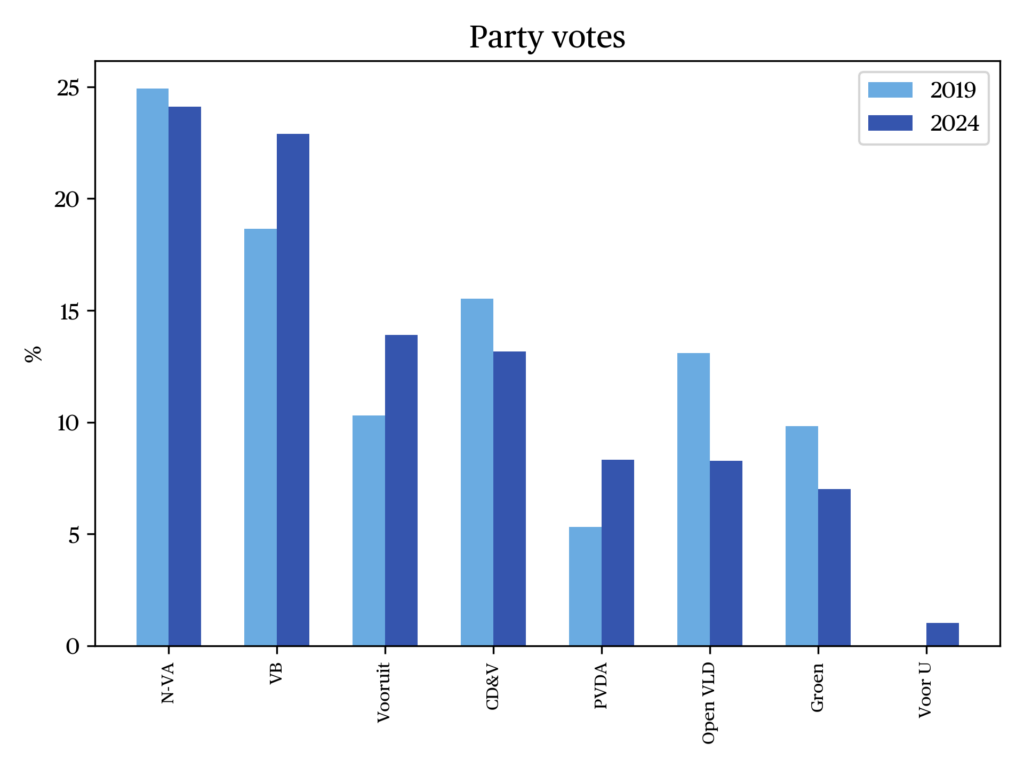
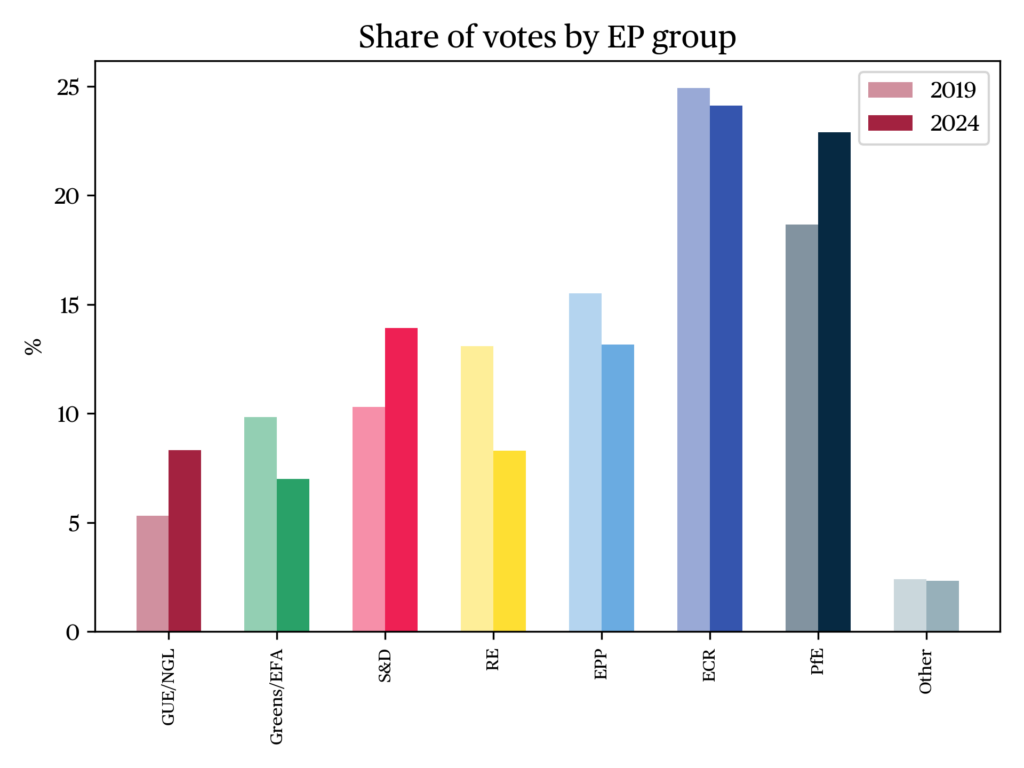
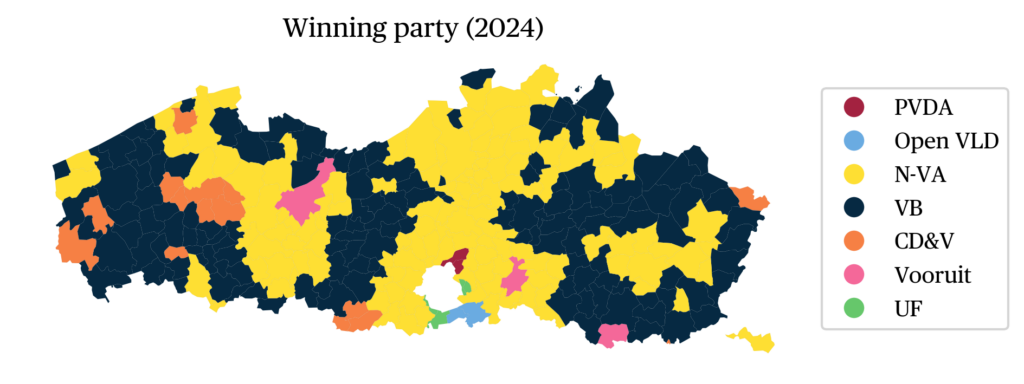
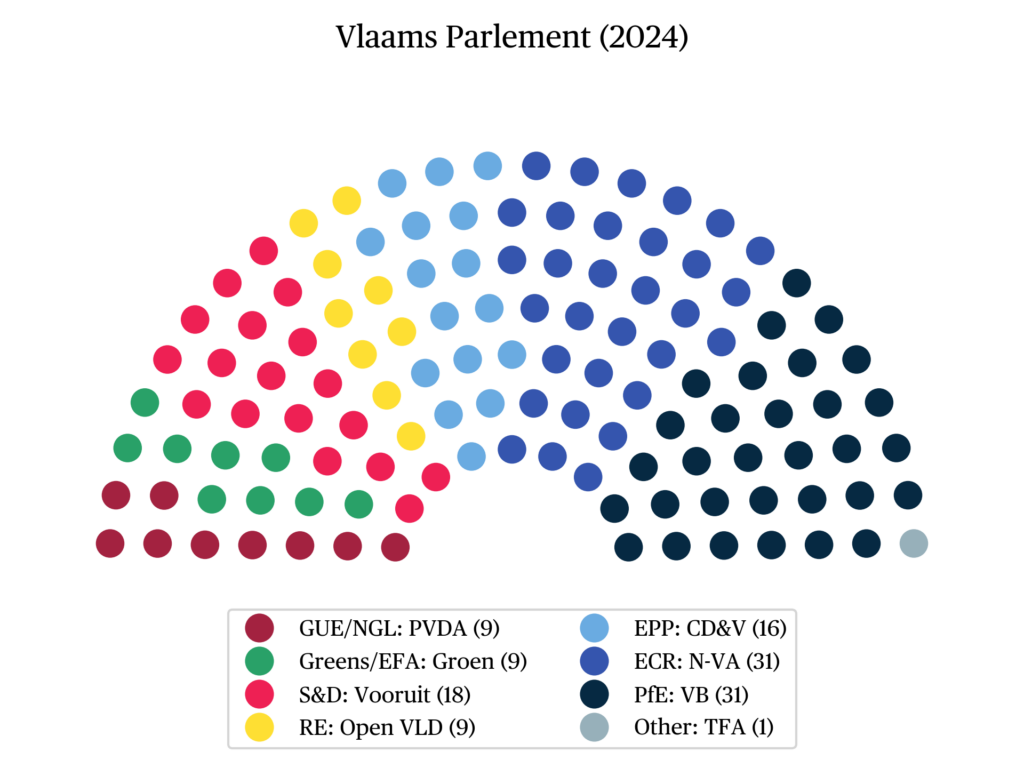
Regional election in Wallonia
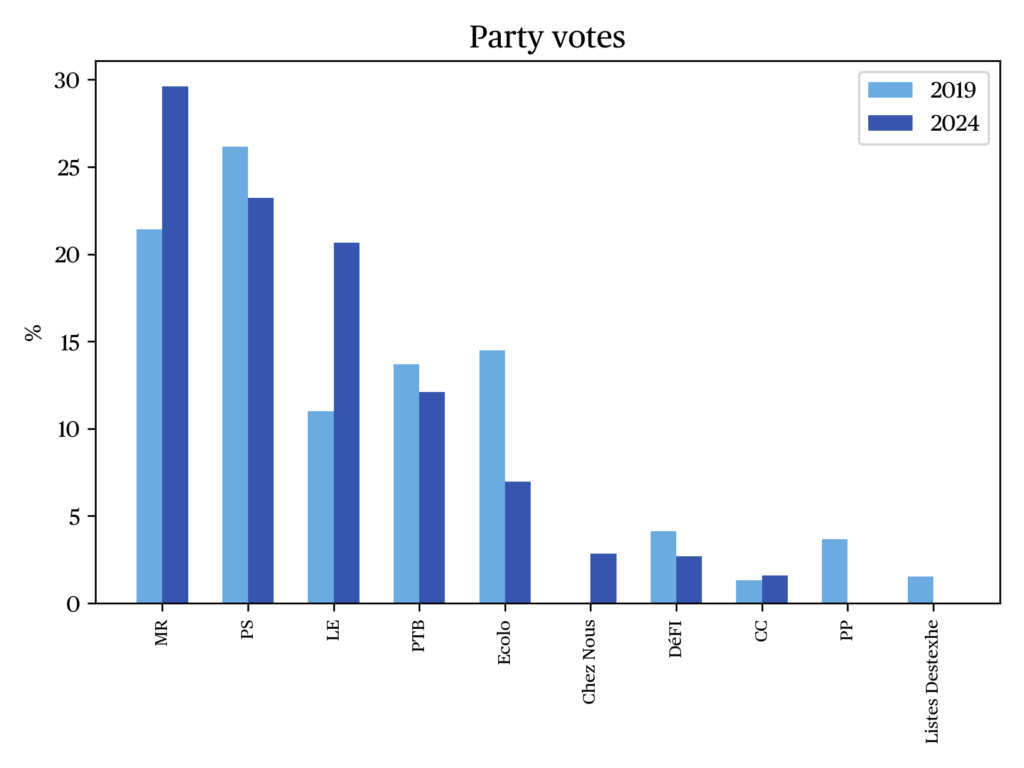
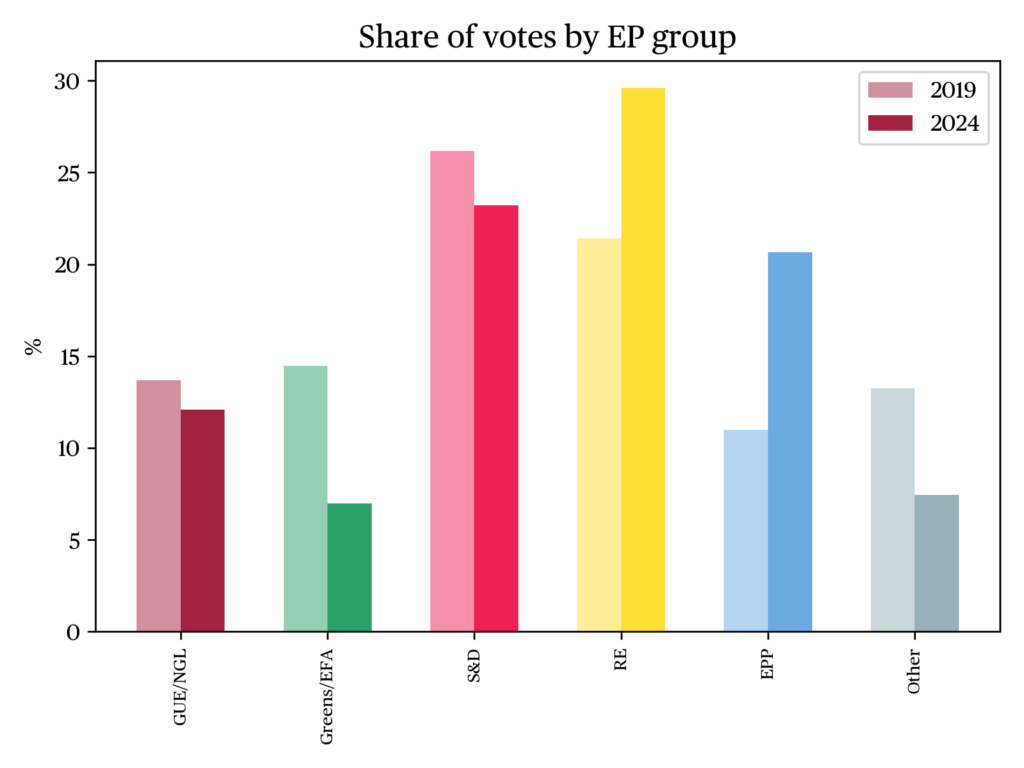
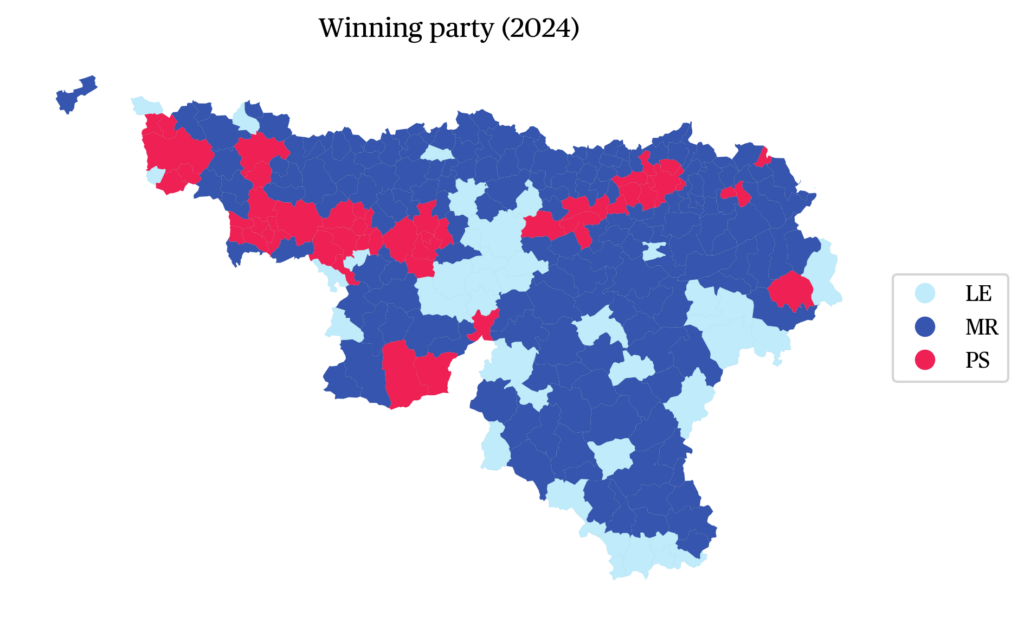
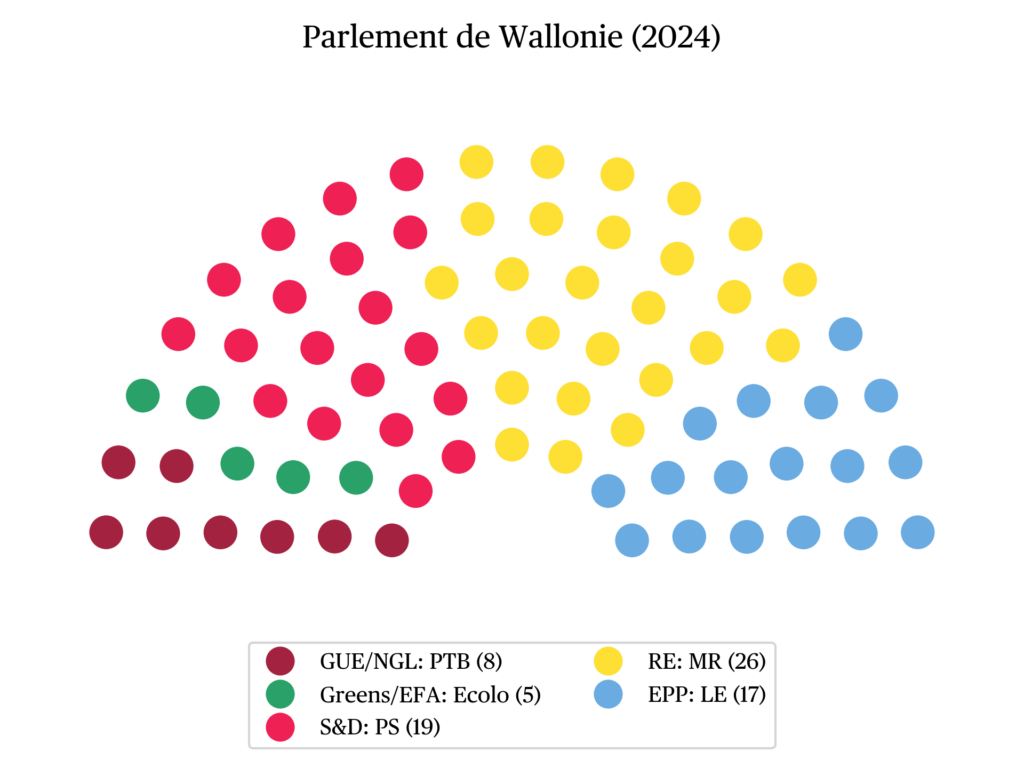
Regional election in Brussels (French-speaking constituency)
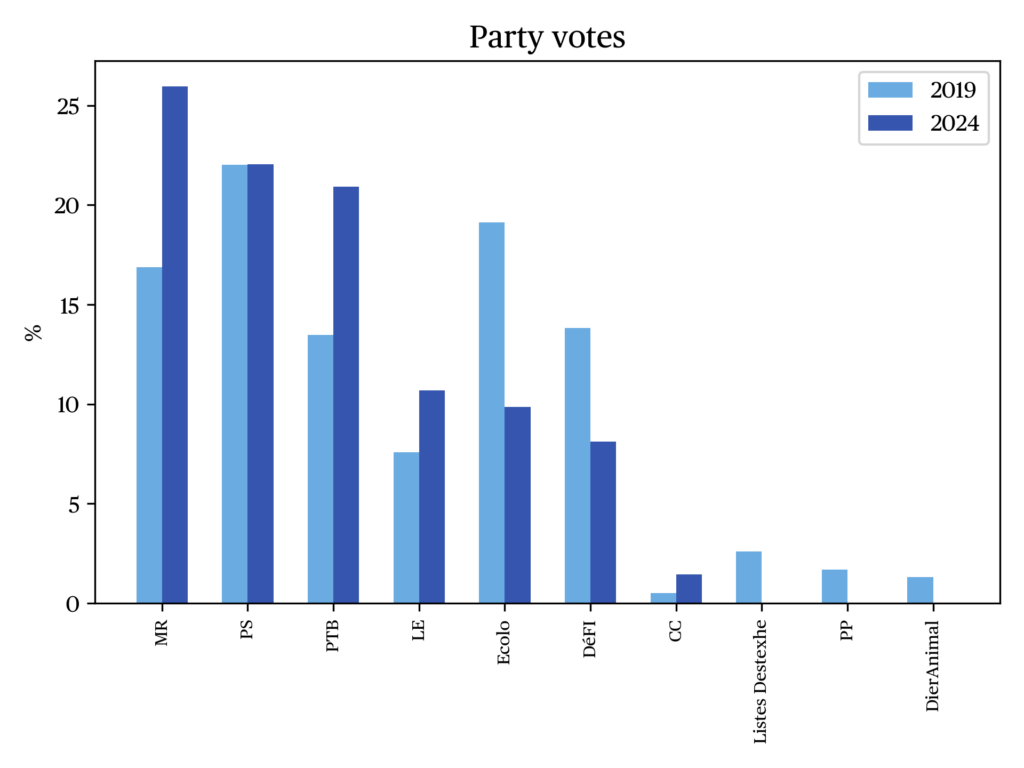
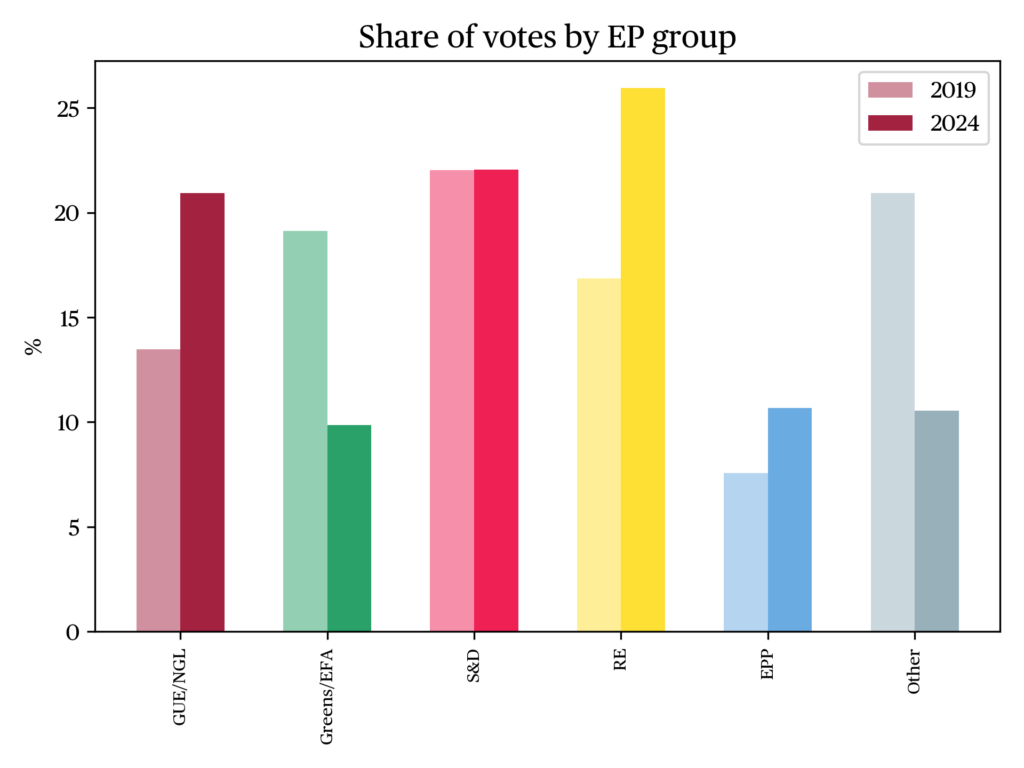
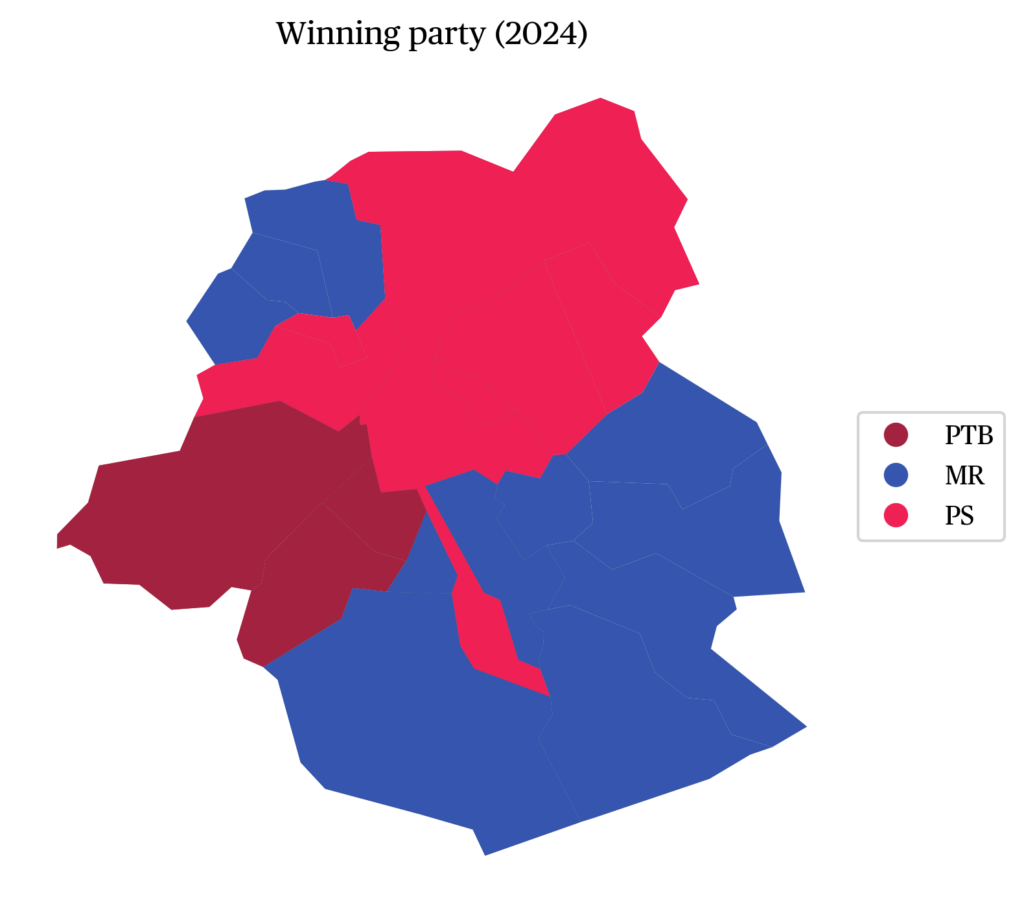
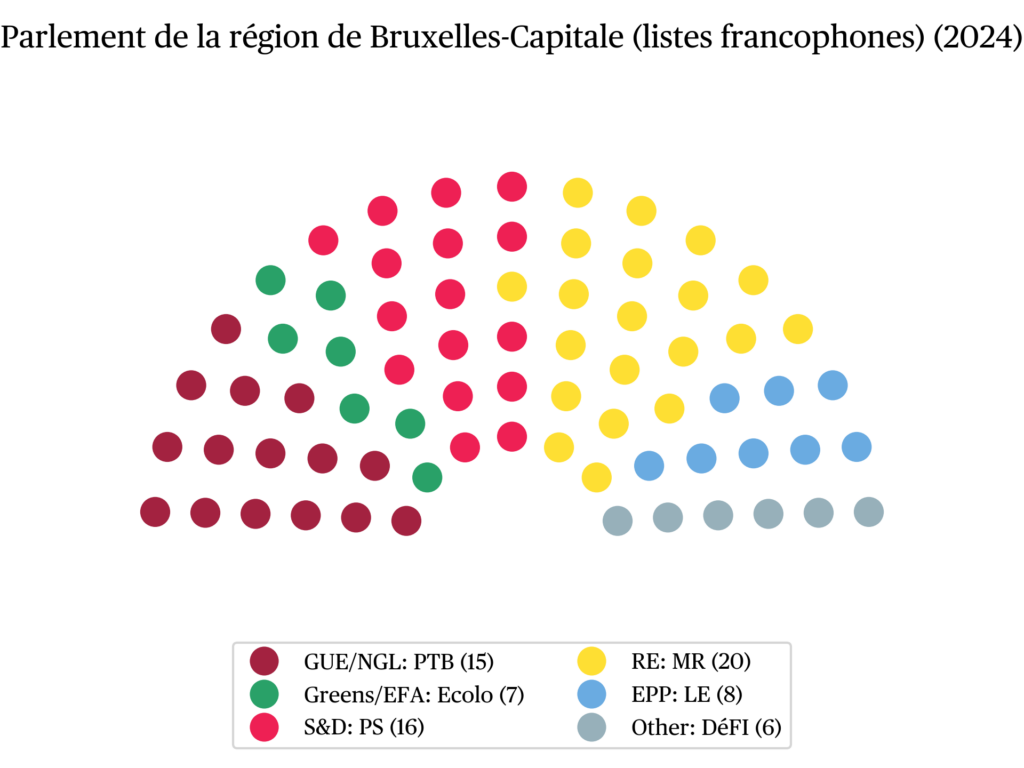
Regional election in Brussel (English-speaking constituency)
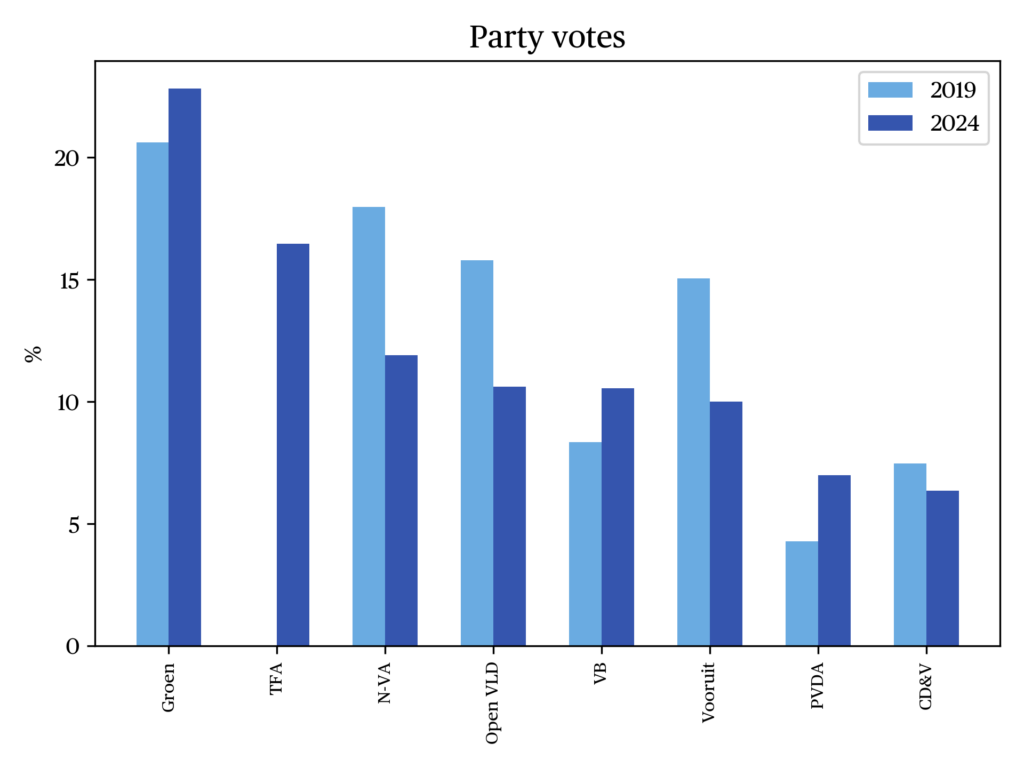
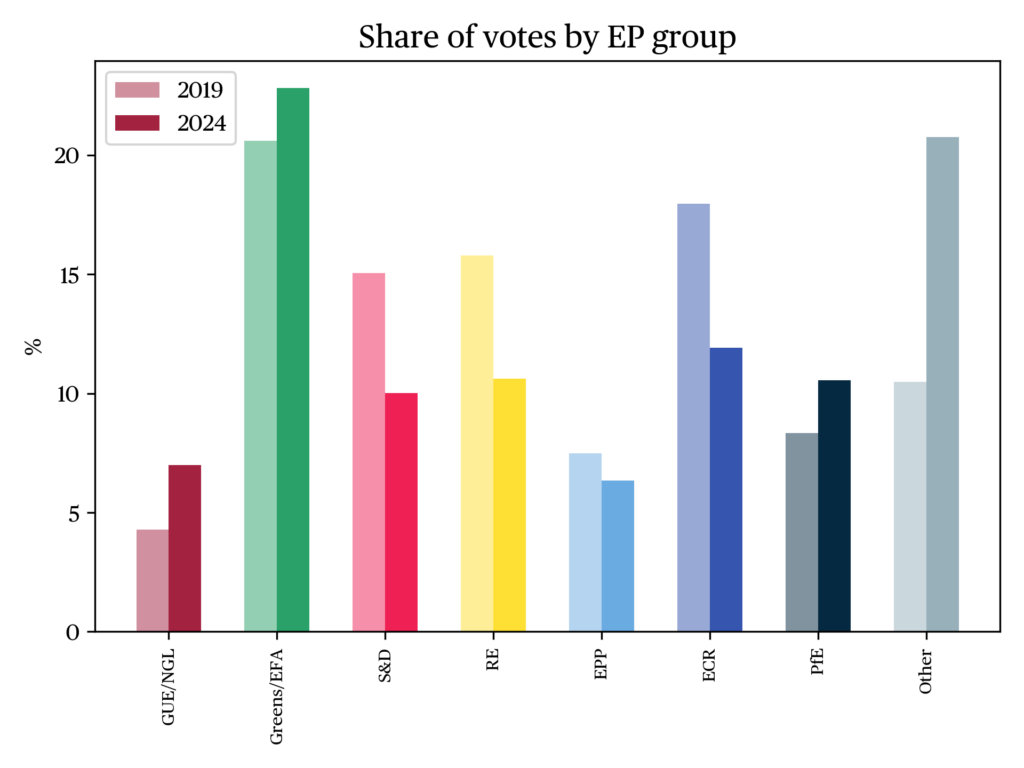
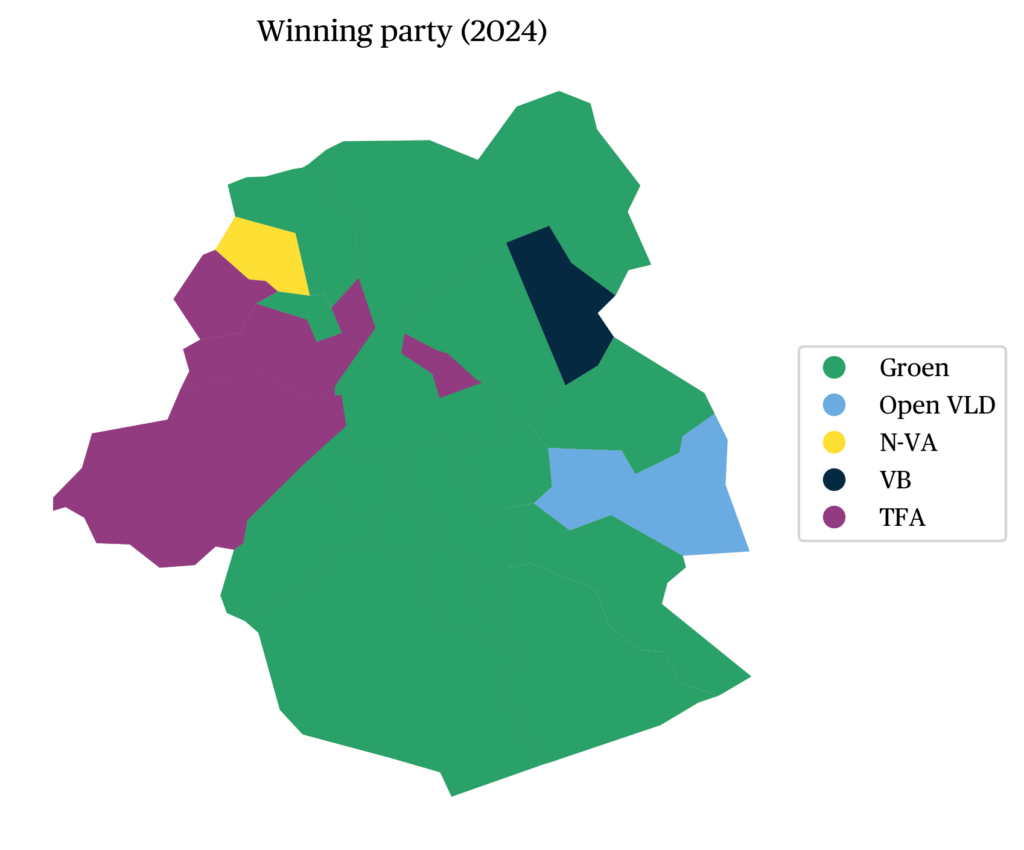
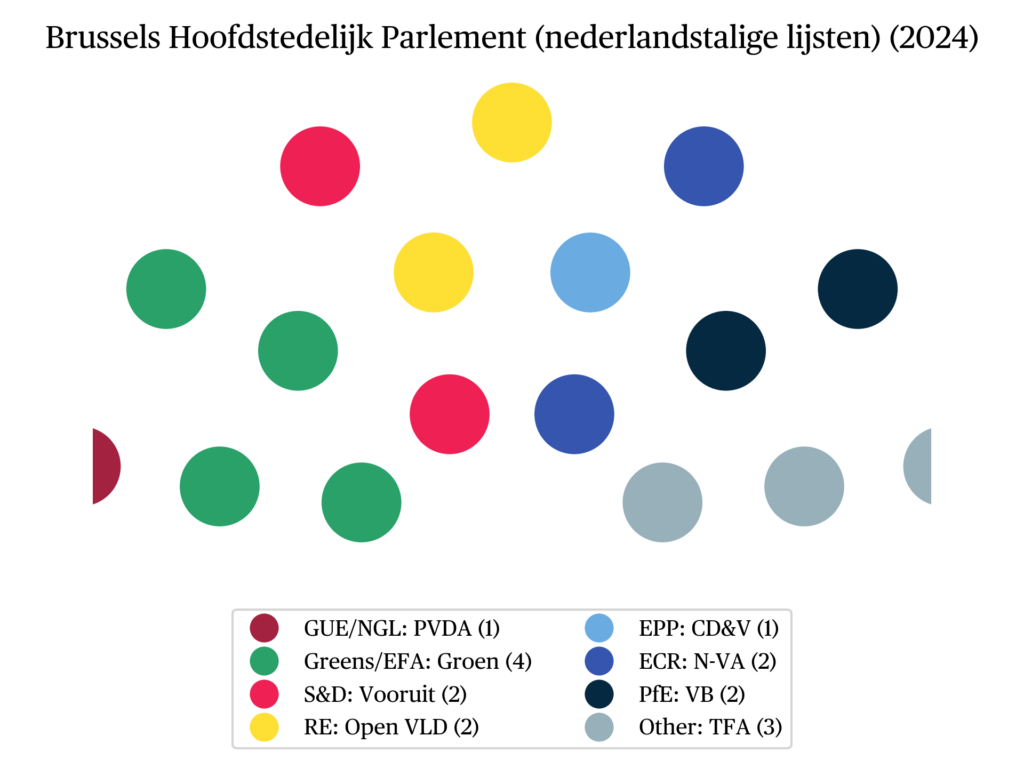
Federal election
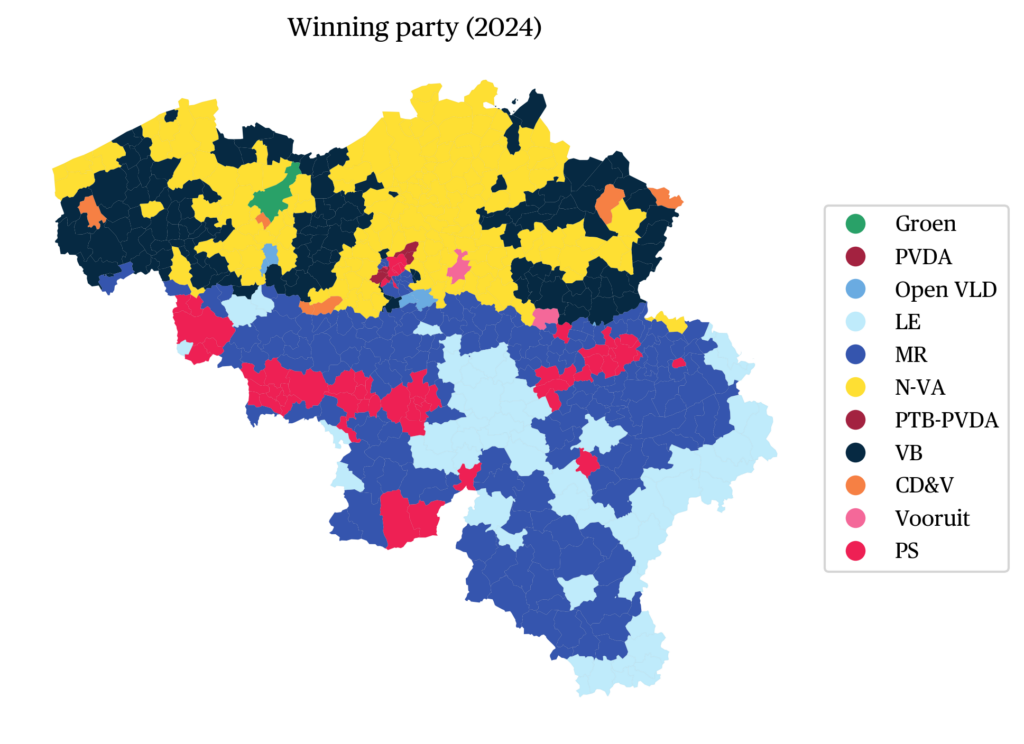
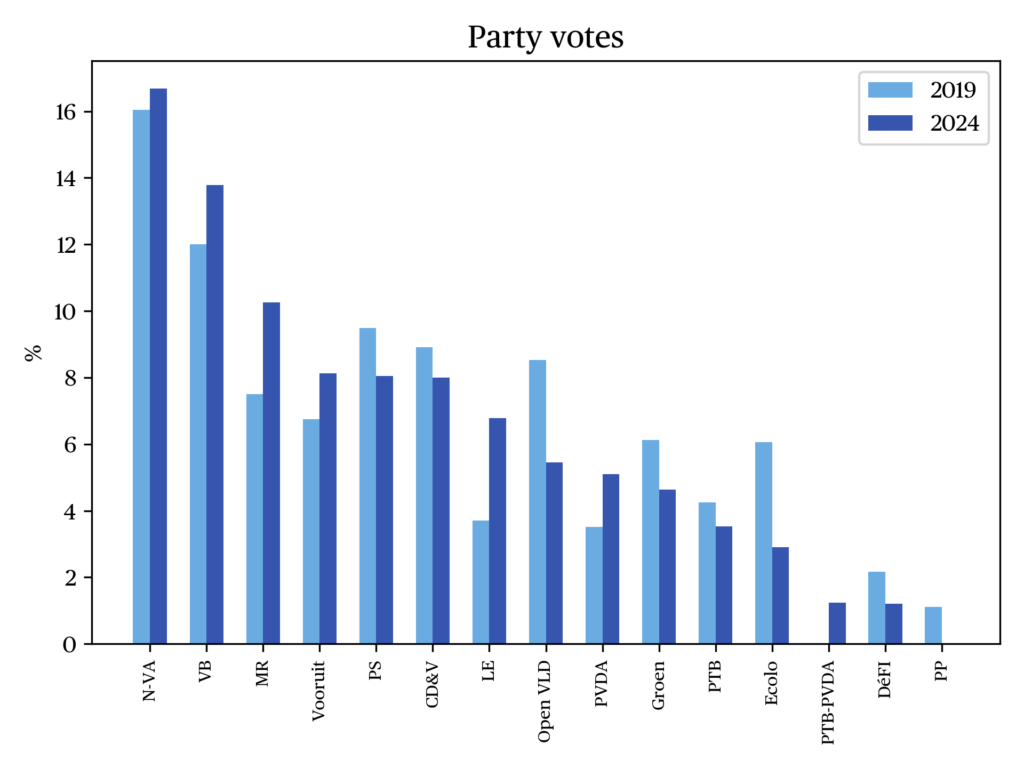
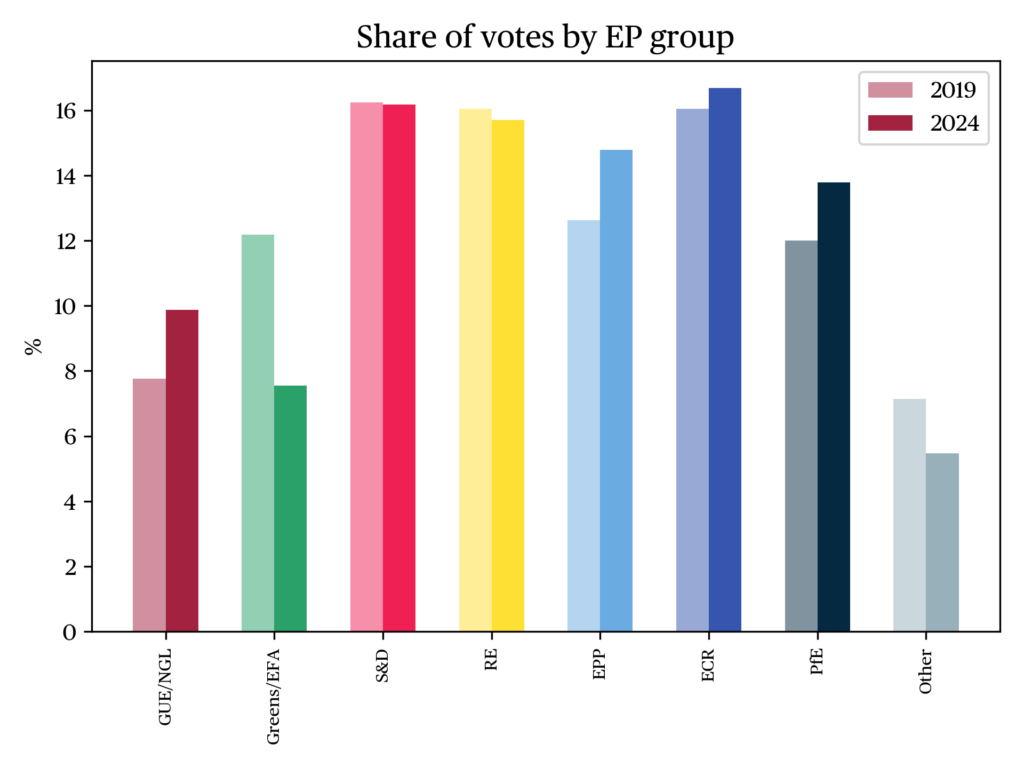
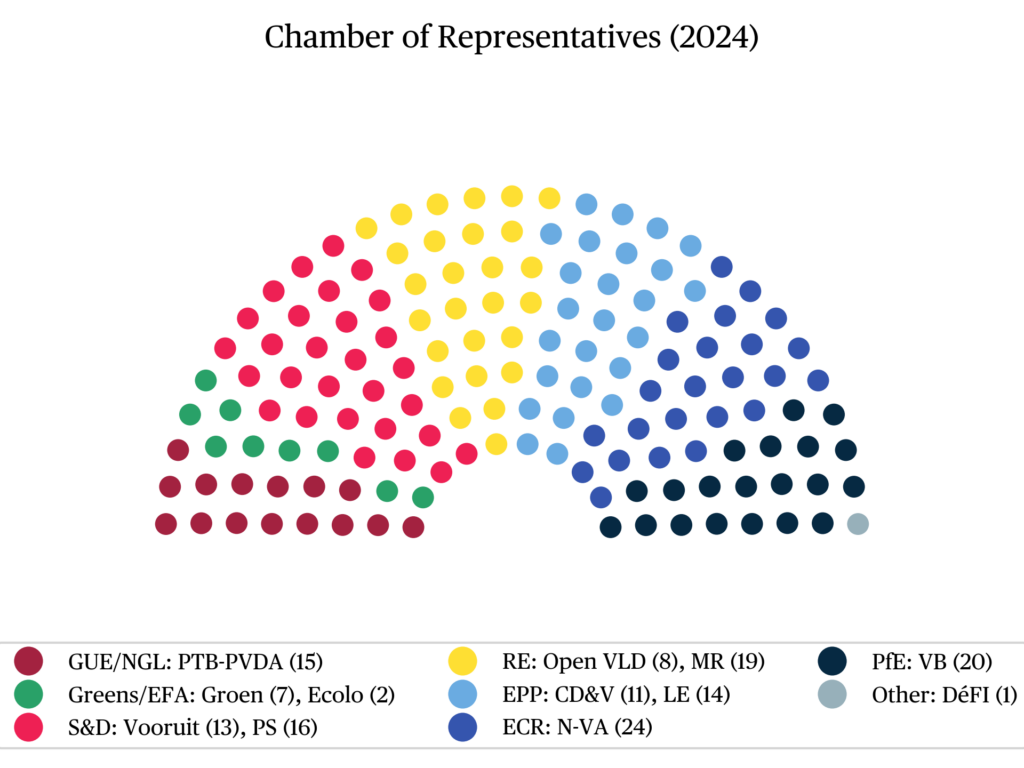
References
Abts, K., Meuleman, B., Swyngedouw, M., Meeusen, C., Delespaul, D., & Roelandts, E. (2024). Profils et comportements des électeurs lors du scrutin fédéral du 26 mai 2019. Courrier hebdomadaire du CRISP, 2597-2598(12), 1–74.
Biard, B. (2024, May 30). L’extrême droite à l’approche des élections de 2024 : enjeux et perspectives en Belgique.
Biesemans, R., Delwit, P., Vandeleene, A., & van Haute, E. (2024). Les dynamiques de vote à Bruxelles le 9 juin 2024. Premiers éléments. Note du Centre d’étude de la vie politique.
Delespaul, D., Meeusen, C., Abts, K., & Swyngedouw, M. (2025). Two worlds, one nation? Comparing the political spaces of Flanders and Francophone Belgium. European Political Science Review, 17(2), 279–296.
Delwit, P. et Van Haute, É. (2019). Les élections du 26 mai 2019 : une impressionnante refonte du paysage politique bruxellois. Les Cahiers du Cevipol, 6(6), I-33.
Legein, T., & Rangoni, S. (2024). Between Decline and Distress Innovations: The Transformation of the Belgian French-Speaking Christian-democratic Party (cdH). Political Studies, advance online publication.
Rangoni, S., Legein, T., Talukder, D., & van Haute, E. (2025). Why do political parties use democratic innovations for internal reforms? The case of the Belgian French-speaking Christian Democratic Party. In Political Parties and Deliberative Democracy in Europe (pp. 139–155). Routledge.
Pilet, J. B. (2021). Hard times for governing parties: The 2019 federal elections in Belgium. West European Politics, 44(2), 439–449.
Swyngedouw, M., Delespaul, D., & Abts, K. (2023). Alles beweegt! De verschuivingen in stemgedrag tussen 2014 en 2019. In K. Abts, C. Meeusen, B. Meuleman & M. Swyngedouw (Eds.), De Breuklijnen Voorbij? Politieke, Culturele en Economische Scheidslijnen in de Publieke Opinie (pp. 61–90).
Walgrave, S., Pilet, J-B., Lefevere, J., Eck, B., & Jacobs, L. (2024, September 6). Voter shifts 2019-2024 and during the 2024 campaign.
Notes
- The new Muslim-interest party Team Fouad Ahidar (TFA, NI) managed to gain a final seat by scoring exceptionally well in the Flemish Parliament constituency in Brussels. The party managed to replicate its surprising success to some extent in the local elections of October, by gaining seats in Vilvoorde and some municipalities in the Brussels-Capital Region.
citer l'article
Romain Biesemans, Daan Delespaul, David Talukder, Federal and regional elections in Belgium, 9 June 2024, Sep 2025,
à lire dans cette issue
voir toute la revue





